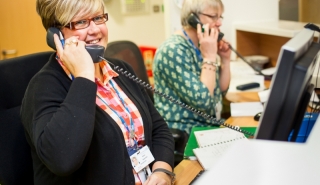In this section
Diabetes psychology
The Diabetes Psychology Service offers psychological assessment and treatment to adults who are diagnosed with Type 1 diabetes. There is 0.6 WTE of psychology input into the service.
Where does psychology fit into diabetes care?
Living with diabetes doesn’t mean that someone is definitely going to struggle, or that things will always feel difficult when they do. Diabetes can be a very demanding condition to live with and uniquely challenging in some ways. These demands can lead to diabetes distress and diabetes burnout. Diabetes can also make other challenging things in life harder to manage.
At those times, talking to friends or family can be enough to feel better and, at others, something more could be needed; one option is some psychological work.
As well as offering individual work, the diabetes psychology service contributes consultation and training for colleagues. This is to integrate psychological approaches and understanding into care.
If you’ve been referred to the psychologist, or are thinking about a referral, you can find out more about the Diabetes Psychology Service, and the process of referral, assessment and psychological work here, or about different therapy models here.
You can also learn more about low mood, high levels of anxiety and difficult relationships with food via these links.






